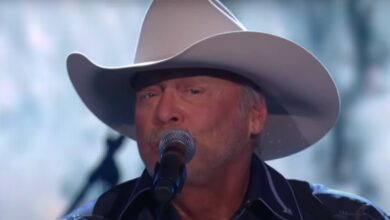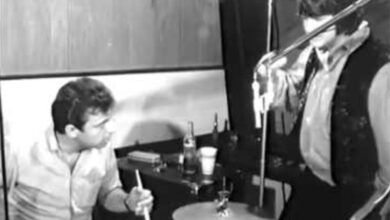His voice pained; he passed two months later, still a lion, though weaker
Johnny Cash’s final live performance, held on July 5, 2003, at the Carter Family Fold in Hiltons, Virginia, stands as a poignant testament to his enduring legacy as one of the most iconic figures in American music history. At the time, Cash was grappling with significant health challenges, including deteriorating vision and physical frailty, which were compounded by the recent loss of his beloved wife, June Carter Cash, just months earlier. Despite these hardships, Cash displayed remarkable resilience and dedication to his craft, delivering a performance that resonated deeply with the audience.
Opening the concert with his trademark greeting, “Hello, I’m Johnny Cash,” the legendary musician was supported by a small band that included his son, John Carter Cash, on vocals, alongside Jerry Hensley on guitar and Bobby Starnes on bass. The setlist for the evening included many of Cash’s most cherished songs, such as “Folsom Prison Blues,” “I Walk the Line,” “Ring of Fire,” “Big River,” and Kris Kristofferson’s poignant “Sunday Mornin’ Comin’ Down.” Each song was delivered with a raw intensity that spoke to Cash’s ability to channel his own life experiences into his music.
One of the most touching moments of the evening came during Cash’s rendition of “Angel Band,” a song that had been sung by Emmylou Harris at June Carter Cash’s funeral. This performance served as a deeply personal tribute to his late wife, underscoring the profound loss he was experiencing. Another poignant highlight was Cash’s performance of “Understand Your Man,” a song he hadn’t sung in over two decades. This rare inclusion added a nostalgic layer to the evening, reflecting on his journey as an artist and the passage of time.
Throughout the concert, Cash’s voice, though weathered by age and illness, retained a profound emotional depth that captivated the audience. He spoke openly about the presence of June’s spirit and the enduring inspiration she provided him, creating a palpable connection between his personal life and his music. This ability to blend personal emotion with musical performance was a hallmark of Cash’s career, and it was on full display during this final concert.
Johnny Cash’s impact on American music extended far beyond his distinctive voice and rebellious spirit. His ability to transcend genres—from country to rock to folk—earned him a diverse and devoted fan base. Beyond music, Cash was known for his humanitarian efforts and advocacy for social issues, often intertwined with his songs. His concerts were not mere performances but reflective journeys through the human experience, marked by honesty, resilience, and a relentless pursuit of truth.
As Cash took his final bow that evening in Hiltons, Virginia, it marked the end of an era in music history. His legacy as a true American icon continues to resonate, influencing generations of musicians and fans alike. Johnny Cash’s final performance was more than just a farewell; it was a profound testament to his enduring spirit, his unwavering commitment to his art, and the indelible mark he left on the world through his music and humanity.





